Advertisement
Commentary
Putting A Price On Carbon: It Was Hot, Now It's Not

“A carbon tax is the most straight-forward and efficient strategy for quickly reducing greenhouse gas emissions.” That statement, from Bernie Sanders in 2014, was accepted as gospel in climate policy circles for many years.
Today, not so much. The evolving political consensus, at least on the left, has relegated carbon pricing to second-tier status, while measures involving more targeted government intervention have gained prominence.
Adding a tax to the price of carbon-based fuels to capture their real cost to society has long enjoyed broad appeal. Taxing pollution produced by the fossil fuel industry resonates with progressives, and, as a broad-based market mechanism, it also finds favor with conservative economists.
A few states and regional coalitions have successfully implemented some form of carbon pricing. Here in the Northeast, the Regional Greenhouse Gas Initiative is credited with playing a role — albeit minor — in reducing emissions from power generation. The Western Climate Initiative, which currently includes California and Quebec, has a more ambitious emissions cap-and-trade program that encompasses industrial sources and transportation fuels.
At the federal level, carbon pricing seemed to be catching on in 2009, when Ed Markey partnered with House colleague Henry Waxman to pass an economy-wide emissions cap-and-trade bill, but it never made it to the floor of the Senate.

In 2018, Congressman Carlos Curbelo, a Florida Republican, introduced a carbon tax bill that foresaw a reduction of emissions to 40% below the 2005 level by 2050. Once again, intransigence killed the legislation. Subsequently, the GOP-controlled House passed a resolution deeming a carbon tax detrimental to the national economy. And more recent attempts to implement a national carbon fee were non-starters.
The Democrats have now moved on.
Presidential candidate Jay Inslee, who as governor battled doggedly but unsuccessfully for a carbon fee in the state of Washington, has shifted his attention to other climate policies.
There was a carbon-pricing bill in the Massachusetts House this session, but it didn’t make it out of committee. The Legislature is now working on another multifaceted climate bill that does not institute a carbon tax or fee.
A recent draft of the 2020 Democratic Party Platform is silent on carbon pricing. This omission is undoubtedly intentional because it was included in the 2016 platform — it called for greenhouse gases to “be priced to reflect their negative externalities.”
Carbon pricing should absolutely have a role in the nation’s climate policy in this decade, but not a central one.
The Green New Deal, an evolving progressive policy framework introduced by Rep. Alexandria Ocasio-Cortez and Sen. Ed Markey, is likewise agnostic on carbon pricing.
And although Joe Biden told Anderson Cooper last September he’d support a carbon tax, no mention of that support — nor for any other carbon-pricing scheme — appears in the climate action plan he released in mid-July.
Around the country, states have initiatives in the works to reduce their carbon emissions. Some of them include cap-and-trade, cap-and-invest, fee-and-dividend, or another variant of carbon pricing. Citizens Climate Lobby, a grassroots advocacy organization, and the Climate Leadership Council, whose members include noted mainstream economists and numerous Fortune 500 corporations, have both consistently promoted — as the centerpiece of a climate strategy — a carbon-fee-and-dividend approach that rebates tax receipts to households.
But on the whole, the politics of climate change is shifting toward other ways to meet the challenge, and carbon pricing is moving to the back burner. There are several reasons why.
First of all, taxes aren’t popular. In France, a fuel tax increase in 2018 set off the gilets jaunes protests, not because people were ignorant of climate risks, but because they lacked practical transportation options, and they felt the tax was punitive.
Although some carbon pricing programs are designed to minimize the impact on low-income households, opponents jump at the opportunity to paint them with the anti-tax brush. And now the elevated unemployment level resulting from the pandemic makes anything that resembles a tax even more politically fraught.
Furthermore, to achieve meaningful emissions reductions, carbon pricing has to ramp up rapidly. When asked about why he has cooled off on carbon pricing, Jay Inslee said, "To actually get carbon savings, you need to jack up the price so high that it becomes politically untenable."
That price level is critical. In an interview about the Green New Deal, Ed Markey noted that fossil-fuel giants such as ExxonMobil have publicly endorsed a carbon tax, but at a price point that wouldn’t substantially reduce oil consumption. And the major energy companies want immunity from lawsuits as well as the repeal of environmental regulations in exchange for the imposition of a carbon tax.

Big Oil’s support for a carbon tax raises red flags with left-leaning climate activist groups like Sunrise Movement, closely associated with the Green New Deal, and Extinction Rebellion, known for its audacious direct action. They consider it unjust to burden the general public with the costs of climate change when alternative revenue sources — repealing fossil fuel subsidies, cutting the military budget, reversing tax cuts for the wealthy, revamping the capital gains and estate taxes — are all options for policymakers.
Carbon pricing should absolutely have a role in the nation’s climate policy in this decade, but not a central one. Its efficacy as a price signal is debatable, but it can definitely help fund related programs, such as investments in research and development of renewable technologies.
What matters is that climate policy in the 2020s must look well beyond passive demand-side market mechanisms like carbon pricing. The states have demonstrated that regulation and renewable portfolio standards, i.e., requiring utilities to purchase increasing amounts of renewable energy, are both effective and politically viable.
The transition to the carbon-free economy will require systemic transformation — a reconciliation of our social and ecological realities with the entrenched infrastructure of the capitalist economy. It’s a far bigger job than what carbon pricing could be expected to achieve.
And it is fair to ask why the machinery of the neoliberal economic system under which climate change has metastasized would now be trusted to contain it.
